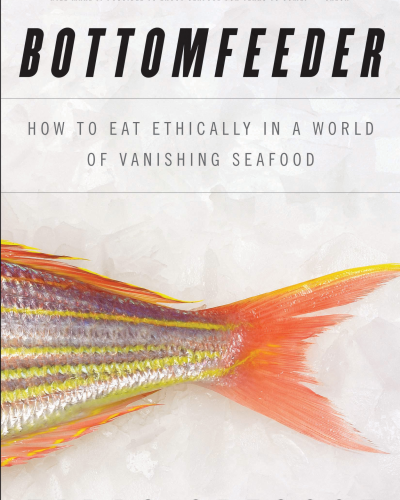If you are among the billions of people around the world who enjoy fish and other delicacies from the sea, this book is for you. Depending on which types of seafood you consume, you may be driving a species toward extinction, or contributing unknowingly to the destruction of coastal ecosystems and the local human communities that depend on them. Closer to home, you may be putting your own health at risk.
If you are among the billions of people around the world who enjoy fish and other delicacies from the sea, this book is for you. Depending on which types of seafood you consume, you may be driving a species toward extinction, or contributing unknowingly to the destruction of coastal ecosystems and the local human communities that depend on them. Closer to home, you may be putting your own health at risk.
That, very briefly, is Montreal-based writer Taras Grescoe’s message in Bottomfeeder: How to Eat Ethically in a World of Vanishing Seafood. Becoming a “bottomfeeder” or, more precisely, feeding at lower levels in the marine food web, is one of several recommendations Grescoe makes to address the ongoing crisis threatening the world’s oceans. At the dinner table, this means replacing bluefin tuna, Atlantic cod, Chilean sea bass and monkfish with sardines, squid, mussels and jellyfish.
Much of what Grescoe, winner of the 2008 Writers’ Trust Non-Fiction Prize, describes has been known for years. But what gives his message new urgency is his first-hand account of unflinchingly eating his way around the world. He begins with monkfish and oysters in the United States, moves on to bouillabaisse in Europe, shrimp in India, shark-fin soup in China, and bluefin tuna, whale meat and even the infamous poisonous pufferfish in Japan, before returning home to Canada for salmon and fish sticks.
On Canada’s East Coast, we have depleted cod stocks by more than 99 per cent, through overfishing and political mismanagement. On the West Coast, we allow aquaculture operators to destroy marine habitats. Grescoe openly wonders whether the government’s real goal is to render Pacific wild salmon extinct, thereby removing a barrier to other forms of “development,” such as oil and mineral exploration, logging and dam construction.
This book will challenge those who believe that wildlife must pay its way in order to be conserved. There is no better example than commercial fisheries to demonstrate that placing a price on wildlife virtually guarantees its depletion. And, as Grescoe found out, there is scant evidence to support claims that the commercial consumptive use of nature provides much in the way of benefits for local communities.
Grescoe convinced me that I need to add farmed salmon, shrimp, monkfish and bluefin tuna to the growing list of seafood I mustn’t eat. Sushi and sashimi probably aren’t wise choices either. Fortunately, I like sardines, one of several options that are still abundant and reasonably free of environmental contaminants.
As Grescoe reminds us, however, it will take more than a few people changing their dietary habits to save the oceans’ occupants. Until consumers the world over exercise their considerable power en masse, there will be no incentive for change. They must deliver the message that they no longer want to eat marine predators or the products of environmentally unfriendly aquaculture operations to processors, retail outlets and the owners of seafood restaurants. Similarly, voters have to convince politicians of the need to introduce stringent labelling requirements for seafood and make it clear that they will no longer tolerate the use of their tax dollars to subsidize the rape of the world’s oceans. Personally, I hope that along the way, someone will finally convince fisheries scientists and managers that the introduction of alien species has to end if we really wish to protect native marine fauna.
If individuals around the world do not exercise power in these ways – and soon – life will go on, driven by greed and the delusion – often expressed as hope – that things will somehow work out. If that is the route we choose, it won’t be long before “empty oceans” join the “empty forest syndrome” found in several parts of the world today.
Bottomfeeder: How to Eat Ethically in a World of Vanishing Seafood, Taras Grescoe, Toronto: HarperCollins Publishers, 2008, 326 pages
This review was originally published in Books from the Deep Green, Issue 35.3. Subscribe now to get more book reviews in your mailbox!
Reviewer Information
David Lavigne, a former zoology professor at the University of Guelph, is the science advisor to the International Fund for Animal Welfare. He is the editor of Gaining Ground: In Pursuit of Ecological Sustainability.













